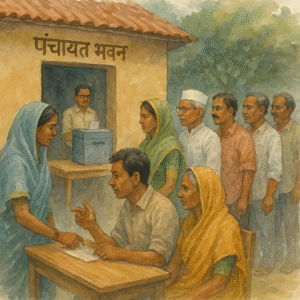Simplified Explanation of the Judgment
In a significant judgment safeguarding the rights of government employees, the Patna High Court allowed the writ petition filed by a retired Executive Engineer who was denied promotion to the post of Chief Engineer. The petitioner had served the Bihar Irrigation Department (now Water Resources Department) since 1962 and had been promoted over time. Despite fulfilling eligibility, he was denied his final promotion due to an allegedly adverse entry in his Annual Confidential Report (ACR) for 1992–93.
The petitioner challenged the decision of the Departmental Promotion Committee (DPC), which, in its 2011 meeting, rejected his promotion claim. This decision was communicated through Letter No. 3243 dated 11.03.2011 issued by the Bihar Public Service Commission (BPSC).
Key points in the case include:
- The petitioner was promoted to Superintending Engineer in 1990 after an earlier criminal case and suspension were quashed by the High Court. He later retired in 1996.
- The State had already admitted in earlier litigation (CWJC No. 13413 of 2009) that the petitioner was entitled to promotion to both posts (Superintending Engineer and Chief Engineer) with effect from 1989 and 1995, respectively.
- While regular promotion to Superintending Engineer was granted retrospectively, promotion to Chief Engineer was withheld, citing an adverse ACR.
The central dispute was whether the said adverse entry was ever communicated to the petitioner, which is a mandatory requirement under service jurisprudence and natural justice.
The High Court found that:
- The adverse remarks recorded by the Principal Secretary in 1992–93 were never substantiated by any proof of service to the petitioner.
- The petitioner denied receiving such communication and the affidavit filed by the State failed to confirm delivery of the adverse ACR.
- The ACR should have been recorded by the Chief Engineer, as per the Bihar PWD Code, not by the Principal Secretary.
- The BPSC and State took inconsistent stands — one cited non-availability of ACRs, the other cited adverse remarks.
Citing multiple Supreme Court judgments including Dev Dutt v. Union of India and Gurdial Singh Fijji v. State of Punjab, the High Court reiterated that any adverse entry must be communicated in writing, and the employee should be given an opportunity to respond.
Since this fundamental procedural safeguard was violated, the Court concluded that the denial of promotion was illegal.
Accordingly, the Court ordered the State and BPSC to grant notional promotion to the petitioner to the post of Chief Engineer with effect from 1.12.1995, along with all consequential monetary benefits, within three months.
Significance or Implication of the Judgment
This judgment reinforces the importance of fairness, transparency, and procedural compliance in government promotions. It reaffirms that:
- No civil servant can be penalized or denied promotion on the basis of uncommunicated adverse remarks.
- Authorities must follow their own service rules and established procedures, especially concerning ACRs.
- Even after retirement, employees retain their right to notional promotions and associated benefits if wrongful actions are proven.
This is a strong message for all departments to maintain procedural integrity and for employees to assert their rights through legal remedies.
Legal Issue(s) Decided and the Court’s Decision with Reasoning
- Whether promotion can be denied based on uncommunicated adverse ACRs?
- Decision: No.
- Reasoning: Non-communication of an adverse ACR violates principles of natural justice and Supreme Court precedents.
- Was the adverse entry properly recorded and served?
- Decision: No.
- Reasoning: There was no proof of service; entry was made by an unauthorized officer as per PWD Code.
- Is the petitioner entitled to notional promotion post-retirement?
- Decision: Yes.
- Reasoning: Promotion was unjustly denied; employee had already been cleared for earlier promotion and suffered due to procedural lapses.
Judgments Relied Upon or Cited by Court (with citations)
- Dev Dutt v. Union of India, (2008) 8 SCC 725
- Gurdial Singh Fijji v. State of Punjab, (1979) 2 SCC 368
- Amar Singh v. Union of India, (2011) 7 SCC 69
- Maneka Gandhi v. Union of India, (1978) 1 SCC 248
Case Title
Bateshwar Sharma v. The State of Bihar & Ors.
Case Number
CWJC No. 16563 of 2011
Citation(s)
2021(1)PLJR 171
Coram and Names of Judges
Hon’ble Mr. Justice Dinesh Kumar Singh
Names of Advocates and who they appeared for
- Mr. Siya Ram Shahi — for the petitioner
- Mr. Amresh Kumar Sinha, AC to GA 1 — for the State
- Mr. Kaushal Kumar Jha — for the BPSC
Link to Judgment
https://patnahighcourt.gov.in/viewjudgment/MTUjMTY1NjMjMjAxMSMxI04=-XcipMX–am1–omEo=
If you found this explanation helpful and wish to stay informed about how legal developments may affect your rights in Bihar, you may consider following Samvida Law Associates for more updates.








